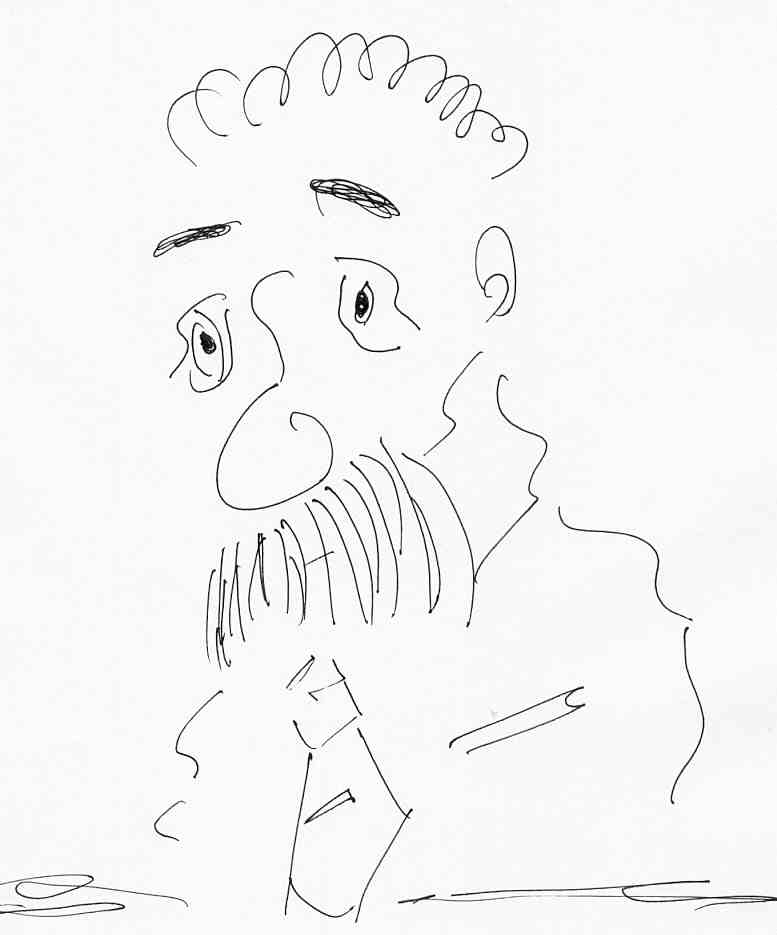More Saroyan
by William Saroyan
In my mind, William Saroyan’s honesty sets him apart from a great many writers who, for one reason or another, allow themselves to believe either the flattering nonsense that is said about them, or that they conjure up on their own to feed their ever-expanding egos. Saroyan wanted fame, and he got it. But he also wanted something else. He wanted to earn his living by doing the only kind of work that was meaningful to him, which was writing. This is not to say that Saroyan lacked anything in the ego department. He knew he was great, and he wanted everyone in the world to know it. He was a showman, a performer, and highly competitive. But he was competing against himself. All his life he’d been on the streets, fighting to make his way. His father died of appendicitis at the age of thirty-six when he was three. He spent time with his brother and sisters in an orphanage in Oakland, California. The family was later reunited in Fresno, where he began selling newspapers on street corners as soon as he was old enough to get the job. From this he graduated to delivering telegrams on a bicycle. He decided to be a writer, bought a used typewriter, learned to type, and didn’t finish high school. He pruned grapevines and ran errands for his uncle. He hitchhiked to Los Angeles, got a job, got sick, and went home. Even then, he knew Fresno wouldn’t do. It was the whole world for him or nothing. He went to New York to become famous and returned unknown a few months later. He went to San Francisco. He learned to drink and to gamble, and worked at perfecting something that had come naturally to him from the beginning, which was, namely, talking big. And he continued to write. When his short story “The Daring Young Man on the Flying Trapeze” was accepted for publication in Story magazine by editors Whit Burnett and Martha Foley late in 1933, he promptly told them that he was going to write a story a day for thirty days and send them each piece as soon as it was done. Most of the stories went on to become his first book. He never looked back. He wrote stories at an alarming rate. Using the money he earned, he began to travel. He went to Europe, Russia, Armenia. By 1939, he’d written himself all the way to Broadway, where he achieved major success with his plays, My Heart’s in the Highlands and The Time of Your Life. The latter won the Pulitzer, which he refused because he “didn’t think commerce should patronize the arts.” He directed some of his own work, and even went so far as to hire people off the street to act. Then came his collection of short stories, My Name Is Aram, his first novel, The Human Comedy, and World War II. After the war, he clashed with Broadway and the literary establishment, and eventually refused to offer any more plays. He gambled and fell deeply into debt, owed back taxes, got married, had two children, wrote, divorced, remarried the same woman, divorced again, and slowly moved into the fine autobiographical work that distinguished his later career. The sample below is from the beginning of Here Comes There Goes You Know Who, an autobiography published in 1962:
I am an estranged man, said the liar: estranged from myself, from my family, my fellow man, my country, my world, my time, and my culture. I am enormously wise and abysmally ignorant. I am also downright stupid. I care so much about everything that I care about nothing. I try like the devil to be honest, only to have this very effort inform me every day that I fail. In between, there I go, never really knowing where I am going, or why. I am little comfort to myself although I am the only comfort I have, excepting perhaps streets, clouds, the sun, the faces and voices of kids and the aged, and similar accidents of beauty, innocence, truth and loneliness. I consider nobody alive greater than myself, and I know that I am nothing, sometimes arrogantly, sometimes decently, with a tender feeling for any form of life near death. I am sick of myself and I have good reason to be. I was born into this sickness, and I began to notice it before I was three. There wasn’t enough to me. I needed more. I took to writing at an early age to escape from meaninglessness, uselessness, unimportance, insignificance, poverty, enslavement, ill health, despair, madness, and all manner of other unattractive, natural, and inevitable things. I have managed to conceal my madness fairly effectively, and as far as I know it hasn’t hurt anybody badly, for which I am grateful.
I am deeply opposed to violence in all of its forms, and yet I myself am violent in spirit, in my quarrel with the unbeatable: myself, my daemon, God, the human race, the world, time, pain, disorder, disgrace and death. I have made a fiasco of my life, but I have had the right material to work with. It may happen that unwittingly I make myself out a kind of hero in this work, but please don’t be fooled. I am not yet clever enough to be able always not to fool myself, but don’t let me fool you too. No man has died as if it were a thought he was thinking, after which he moved along to another thought. I may not die a writer, but I’m a cinch to die Saroyan. . . .
As far as I can tell, writers who take themselves too seriously or who write only for money are unable to write this way. Saroyan was a serious writer, but at the end of the day he knew he was still a human being who would never quite be able to figure things out. And yet he kept trying, mostly through trying to figure out himself. Fortunately for us, he did his figuring with words.
Days of Life and Death and Escape to the Moon
by William Saroyan
This fascinating little journal was published in 1971. It contains entries for the month of August 1967, written at the author’s home in Paris, and November and December of 1968, written in Fresno. It is a compelling mixture of daily detail and memory that reveals Saroyan’s desire to notice himself and what is around him, as well as his natural storytelling ability. Among a great many other things, he talks about aging and work, writing, death, and honesty, all in light of current events, including man’s somewhat childish act of planting a flag on the moon. Along the way, he visits with old friends and relatives, and harvests objects that catch his eye and brings them home for careful study, including rocks, books, an olive branch, and a sunflower:
August 9, Paris
There is a narrow flower bed along the Seine near Pont Alexandre. I studied the situation carefully for successful garden shoplifting, and at the right moment tugged a good young sunflower plant free, carried it an hour, got it home and into a large flower pot before the buds had fallen off or wilted. The fact is sunflowers are as tough as weeds. Most of them are weeds. They will grow anywhere, under almost any conditions. . . .
By the time William Saroyan had finished his last entry for December 1968, he was sixty years old. His eyes were on the past as well as the unknown future, both of which held his mature and profound interest.
Not Dying
by William Saroyan
In this autobiographical work published in 1963, Saroyan captures life as it’s being lived in an effortless way that makes you appreciate his talent and humanity, as well as his personal predicament, which revolves around his children and his need for money. Ostensibly a record of a year in Paris, Not Dying is the author’s way of meeting all demands at once: coming up with a book to publish, spending time with his children after his divorce, working at his vocation, stretching the boundaries of his art, and living with himself and the choices he has made while facing the knowledge that his time on earth could end at any moment. That it doesn’t constitutes a miracle, and that miracle is echoed in the conversation and laughter that propels his account forward:
. . . The other day when I ate a peach standing at the curb my son was ashamed of me, and later he said, “Honest to God, Pop, when I see you acting like a pig, like when you were eating that peach, I wish you weren’t my father.”
I said to my son, “Well, now, I don’t mind about that at all. You ought to wish you had a better father, but this is the father you have. Be your own father if you want a perfect one. A peach isn’t an easy thing to eat, and I happen to enjoy eating a peach in the street. You’ve got to work swiftly or you’ll lose more of the juice than you ought to lose. Working swiftly, you have got to be nothing more than a pig for a moment, but how long does it take to eat a peach? You read D.H. Lawrence’s little poem in the bookshop where we stopped a moment to look at the books in English. Well, it wasn’t a bad little poem, but the fact is there is only one way to eat a fig, and that’s with your mouth. If the mouth belittles us, that’s too bad, but whether we eat daintily or not daintily, we eat with our mouths, and it comes to the same thing. You can repudiate me as your father any time you like, and perhaps you should, but don’t forget that it works both ways, and I can repudiate you as my son, too, thus repudiating my own father, a man I never knew. And what’s the good of that?” . . .
Of course, being the son of a famous father is another kind of predicament, which, depending on the circumstances, may or may not be possible to sort through. But if it’s not one thing, it’s another. The man on the street often longs to be famous, while the famous man often longs to be the man on the street. Fathers and sons take turns forgetting what it’s like to be sons and fathers. Then time passes, and someone else comes along and tries to remember what really happened. When he can’t, he makes up a story to suit himself.
Places Where I’ve Done Time
by William Saroyan
This is an appealing collection of memories by an author who was in every sense a man of the world, and who saw something of home in every place he went. Hotel rooms, train stations, theaters, race tracks, and saloons are just a few of the sixty-eight places Saroyan revisits, while showing the important role places play in making us who we are. Family members and celebrities are written about with equal familiarity and care. But the main character of this book is the author himself, who never ceased to be fascinated by human potential and the humorous imperfection of his own existence.
Danish Creamery, Fresno Street, Fresno, 1922
from Places Where I’ve Done Time (1972)
The creamery-faced girls with the creamery-bare arms stood behind the marble counter on which rested, always, four big glass pitchers of buttermilk. Real buttermilk, full of little specks and chunks of golden butter. On the counter were fresh, cool, clean glasses. Also large salt shakers, also of glass. Everything fresh and cool and clean, and not one fly, not even a baby fly, in the place. There was a sign, which was hardly required: “Fresh Buttermilk, All You Can Drink, 5¢.” . . . I never drank less than three glasses, and frequently as many as six or even seven. The slim belly tightened and tried to bulge out somewhere, and I felt renewed, went out, got on my bike, and went back to work. . . .
Back to Favorite Books & Authors

Also by William Michaelian
POETRY
Winter Poems
ISBN: 978-0-9796599-0-4
52 pages. Paper.
——————————
Another Song I Know
ISBN: 978-0-9796599-1-1
80 pages. Paper.
——————————
Cosmopsis Books
San Francisco
Signed copies available
Main Page
Author’s Note
Background
Notebook
A Listening Thing
Among the Living
No Time to Cut My Hair
One Hand Clapping
Songs and Letters
Collected Poems
Early Short Stories
Armenian Translations
Cosmopsis Print Editions
Interviews
News and Reviews
Highly Recommended
Let’s Eat
Favorite Books & Authors
Useless Information
Conversation
Flippantly Answered Questions
E-mail & Parting Thoughts
More Books, Poetry, Notes & Marginalia:
Recently Banned Literature
From The Bicycle Rider in Beverly Hills
by William Saroyan
I have driven my Cadillac more than 100,000 miles. The cross-country drives were great, from the Pacific to the Atlantic, or the other way around. But I have never driven to evening without loneliness, despair, regret, and all the other things that are of the end. For one end evokes the others, and the end of the day evokes the end of life, especially for the traveler. The end of life evokes the errors of it, and a fellow wishes he had known better. . . .

From “A Writer’s Declaration”
by William Saroyan
. . . I squandered a great deal of money that I earned as a writer and I lost a lot of it gambling. It seems to have been my nature to squander and to gamble, that’s all. I gave some away, perhaps a great deal. I am not unaware of the possible meaning of the discomfort I have felt when I have had money, and the compulsion I have had to get rid of it somehow or other. I think I have felt the need to be only a writer, a writing writer, and not a success of any kind. . . .

A letter to Guy de Maupassant
from Letters from 74 rue Taitbout
by William Saroyan
Guy de Maupassant: I remember wandering around one afternoon at Fresno Technical High School, where I was learning typing, eleven or twelve years old, in 1919 or 1920, desperate as only a man of that many years can be, angry at something or somebody, alone in spirit, bored, and hoping that I might find in the library something to speak to me.
I found a story called “The Bell.” I sat down and began to read it, not knowing what it was or what effect it was going to have on me.
Guy de Maupassant, your story told me to write, and that’s all I needed to know.
Six or seven years ago your specialist, Artine Artinian, an editor and translator, wrote to writers all over the world inviting them to say what your writing meant to them. Many were faithful, or at any rate almost so, but many more were almost embarrassed that they had ever been deeply moved by your writing or had ever cherished it.
Well, the hell with them. I remain faithful.
Your writing is your writing. Nobody else has ever written in that living manner, and every writer who has ever read your writing has been improved by it.
I thank you again, as I do every year.